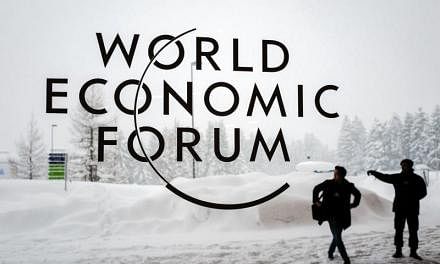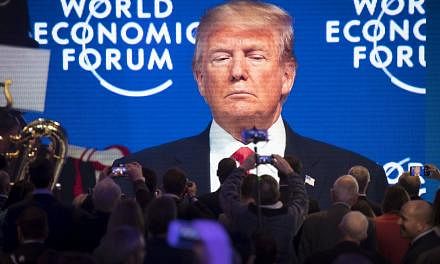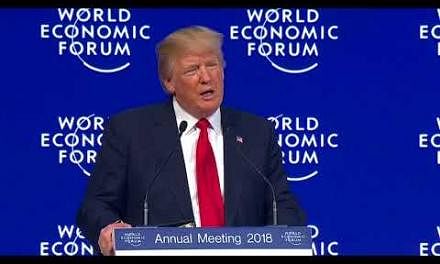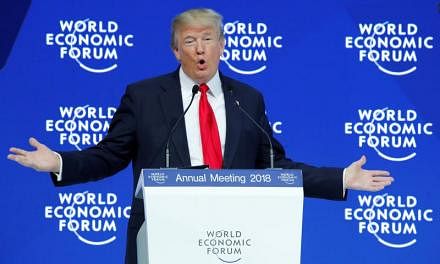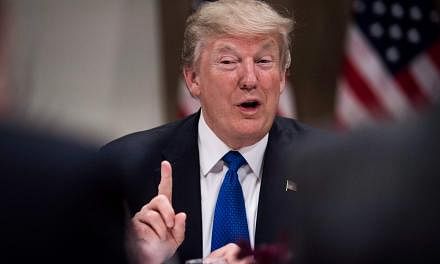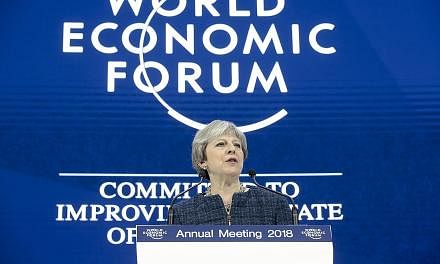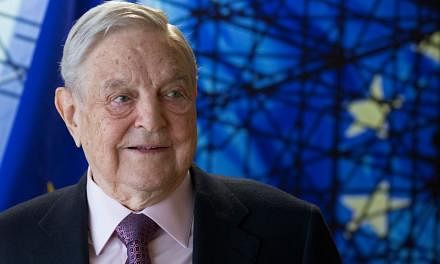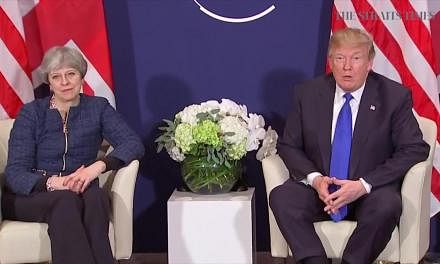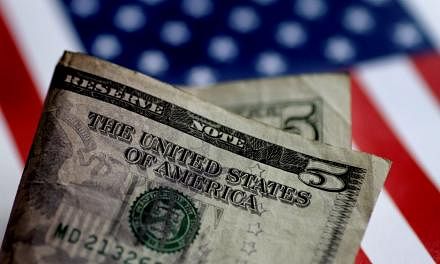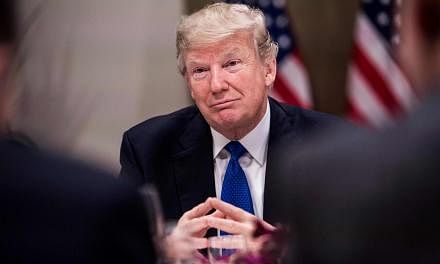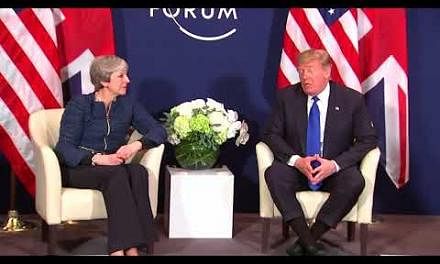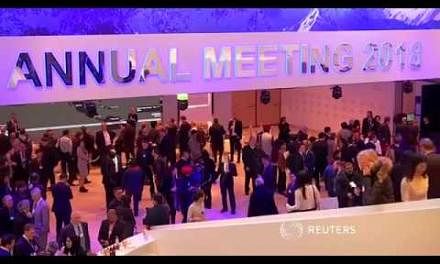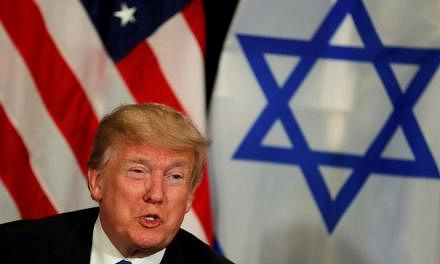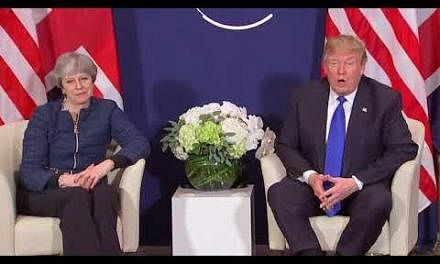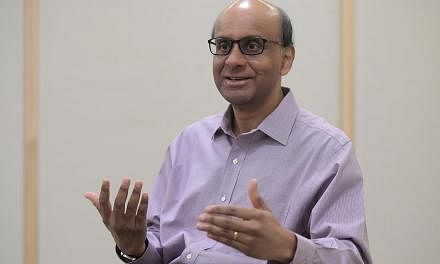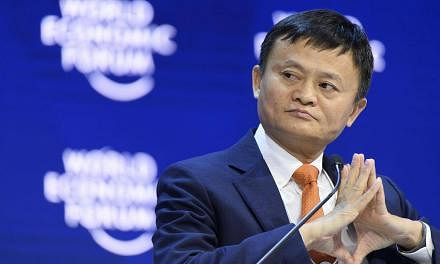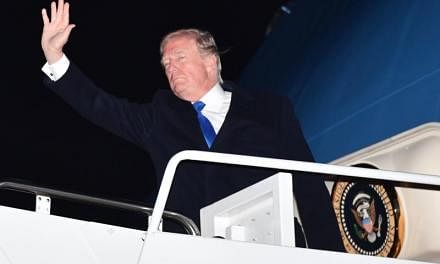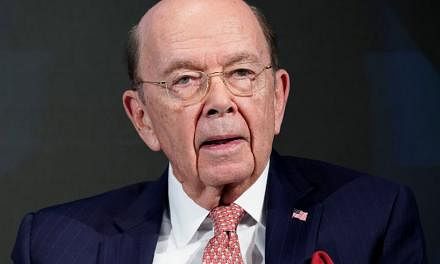DAVOS, Switzerland (REUTERS) - The Singapore dollar rose to its highest in over three years on Thursday (Jan 25) after US Treasury Secretary Steven Mnuchin welcomed a weaker dollar on Wednesday, sending the greenback reeling and underlining concerns that US President Donald Trump is stepping up his attack on China and other big trading partners as part of his America First agenda.
The Singdollar was trading at 1.3083 to the US currency around 9:40am, up 0.3 per cent from its close on Wednesday. The US dollar rout this week on fresh fears of a trade war now sees the Singapore unit at its highest since it closed at 1.3050 to the greenback on Dec 17, 2014.
Mnuchin made his remarks, seen by markets as a departure from traditional US currency policy, at the World Economic Forum in Davos, where other world leaders have made swipes at what they see as US protectionism.
Tough US talk on trade, on the eve of Trump's arrival at the Swiss ski resort on Thursday, contrasted sharply with a chorus of government leaders, from India and Brazil to Germany and Canada, who urged cooperation and criticised protectionism.
"Obviously, a weaker dollar is good for us as it relates to trade and opportunities," Mnuchin told a press briefing.
Commerce Secretary Wilbur Ross later told CNBC that his colleague was "not advocating for a weaker dollar", but he also struck a combative tone.
Asked if he was concerned about sparking a trade war, Ross said: "Trade war has been in place for quite a little while, the difference is the US troops are now coming to the ramparts."
Pressed about Mnuchin's remarks, White House spokesman Sarah Sanders said at a daily briefing in Washington: "We believe in a free-floating currency. The president has always believed in that.
"We have... a very stable dollar, in large part due to how well the US economy is doing right now," she added.
Mnuchin's comments provided a fresh trigger for dollar selling and raised questions about whether a weaker US currency could provide a long-term impetus for the economy.
The dollar index, which measures the greenback against a basket of six major currencies, was down 1 per cent at 89.198, slipping below 90 for the first time since December 2014. The dollar was down about 1 per cent against the yen.
"It's quite significant given that this is the first time in a very long time that a Treasury Secretary has spoken against a strong dollar," said Sireen Harajli, FX strategist at Mizuho.
Gold prices rose, hitting their highest level since August 2016, as investors sought insurance against fears of rising inflation. Spot gold was up 1.4 per cent at US$1,360.23 an ounce.
The annual Davos gathering of world leaders, chief executives and non-governmental agencies has long embraced globalisation, free trade and liberal values.
Trump, the first sitting US president to attend the forum since Bill Clinton in 2000, has questioned that world view. He has threatened to withdraw from the North American Free Trade Agreement (Nafta), disavowed the global climate change accord and criticised institutions such as the United Nations and Nato.
With Trump expected to address the summit on Friday, world leaders here have raised concerns about a return to greater economic protectionism.
Italian Prime Minister Paolo Gentiloni, asked what his message to Trump was, offered a defence of multilateral cooperation and warned against undermining that.
Germany's Angela Merkel, in an address to the forum, evoked the two World Wars and questioned whether the world had learned from them.
French President Emmanuel Macron opened his well-attended speech by joking that the conference "obviously and fortunately didn't invite anyone sceptical" about global warming.
Indian Prime Minister Narendra Modi, Canada's Justin Trudeau and Brazilian President Michel Temer have also embraced the idea of globalisation and cooperation.
Mnuchin defended Trump's agenda.
"This is about an America First agenda. But America First does mean working with the rest of the world," Mnuchin said. "It just means that President Trump is looking out for American workers and American interests no different than he expects other leaders would look out for their own."
Ross said US trade actions were provoked by "inappropriate behaviour on the part of our trading counterparties".
AMERICAN JOBS
On Tuesday, the United States slapped steep import tariffs on washing machines and solar panels, moves billed as a way to protect American jobs. China and South Korea condemned the tariffs, with Seoul set to complain to the World Trade Organisation over the "excessive" move.
"Many countries are very good at the rhetoric of free trade but in fact actually practise extreme protectionism," Ross said.
The Commerce Secretary also said US trade authorities are investigating whether there is a case for taking action against China for infringing intellectual property, calling Beijing's 2025 technology strategy a threat.
A slide in the US dollar should help US exporters, but Mnuchin also added a nuanced outlook: "Longer term, the strength of the dollar is a reflection of the strength of the US economy and the fact that it is and it continues to be the primary currency in terms of the reserve currency."
The US delegation is the largest ever to come to Davos, with 10 members of Trump's Cabinet and senior White House staff, Mnuchin said. Delegates include Jared Kushner, Trump's son-in-law and adviser.
Mnuchin said American involvement in a new Asia-Pacific trade pact between 11 countries was "not off the table", despite Washington pulling out of early talks on the deal last year.
But he added: "We are fans of bilateral trading agreements." Earlier on Tuesday, Canada's Trudeau called the new trade agreement, expected to be signed in Chile in March, the "right deal".
Ross said Trudeau's comments needed to be taken in the context of the latest round of talks on Nafta. Perhaps there was some inclination to use that to "put pressure on the US in the Nafta talks", Ross said.
With additional information from The Straits Times

